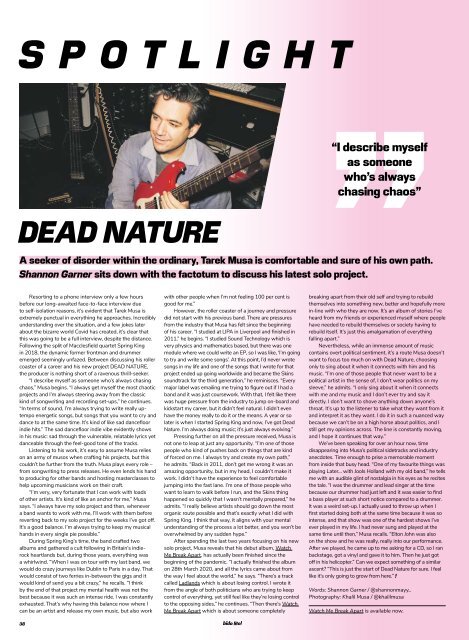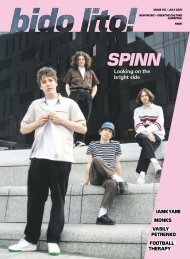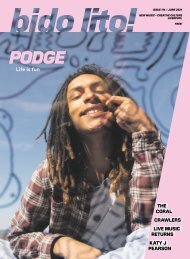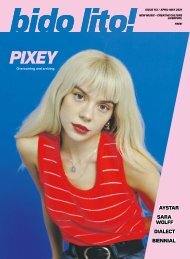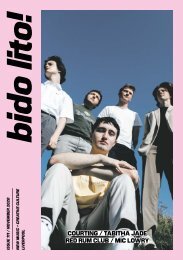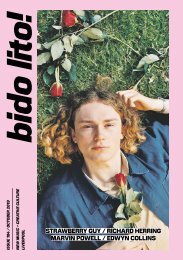Bido Lito! Magazine | Issue 116 | August 2021
LIVERPOOL NEW MUSIC & CREATIVE CULTURE. Featuring: KOJ, DORCAS SEB, WYNDOW, KELLY LEE OWENS, ANDY MCCLUSKEY, LOVE, LIVERPOOL, NATALIE AND THE MONARCHY, HUSHTONES, ALI HORN, NEWS, PREVIEWS, REVIEWS AND MORE.
LIVERPOOL NEW MUSIC & CREATIVE CULTURE.
Featuring: KOJ, DORCAS SEB, WYNDOW, KELLY LEE OWENS, ANDY MCCLUSKEY, LOVE, LIVERPOOL, NATALIE AND THE MONARCHY, HUSHTONES, ALI HORN, NEWS, PREVIEWS, REVIEWS AND MORE.
You also want an ePaper? Increase the reach of your titles
YUMPU automatically turns print PDFs into web optimized ePapers that Google loves.
SPOTLIGHT<br />
“I describe myself<br />
as someone<br />
who’s always<br />
chasing chaos”<br />
DEAD NATURE<br />
A seeker of disorder within the ordinary, Tarek Musa is comfortable and sure of his own path.<br />
Shannon Garner sits down with the factotum to discuss his latest solo project.<br />
Resorting to a phone interview only a few hours<br />
before our long-awaited face-to-face interview due<br />
to self-isolation reasons, it’s evident that Tarek Musa is<br />
extremely punctual in everything he approaches. Incredibly<br />
understanding over the situation, and a few jokes later<br />
about the bizarre world Covid has created, it’s clear that<br />
this was going to be a full interview, despite the distance.<br />
Following the split of Macclesfield quartet Spring King<br />
in 2018, the dynamic former frontman and drummer<br />
emerged seemingly unfazed. Between discussing his roller<br />
coaster of a career and his new project DEAD NATURE,<br />
the producer is nothing short of a ravenous thrill-seeker.<br />
“I describe myself as someone who’s always chasing<br />
chaos,” Musa begins. “I always get myself the most chaotic<br />
projects and I’m always steering away from the classic<br />
kind of songwriting and recording set-ups,” he continues.<br />
“In terms of sound, I’m always trying to write really uptempo<br />
energetic songs, but songs that you want to cry and<br />
dance to at the same time. It’s kind of like sad dancefloor<br />
indie hits.” The sad dancefloor indie vibe evidently shows<br />
in his music: sad through the vulnerable, relatable lyrics yet<br />
danceable through the feel-good tone of the tracks.<br />
Listening to his work, it’s easy to assume Musa relies<br />
on an army of musos when crafting his projects, but this<br />
couldn’t be further from the truth. Musa plays every role –<br />
from songwriting to press releases. He even lends his hand<br />
to producing for other bands and hosting masterclasses to<br />
help upcoming musicians work on their craft.<br />
“I’m very, very fortunate that I can work with loads<br />
of other artists. It’s kind of like an anchor for me,” Musa<br />
says. “I always have my solo project and then, whenever<br />
a band wants to work with me, I’ll work with them before<br />
reverting back to my solo project for the weeks I’ve got off.<br />
It’s a good balance. I’m always trying to keep my musical<br />
hands in every single pie possible.”<br />
During Spring King’s time, the band crafted two<br />
albums and gathered a cult following in Britain’s indierock<br />
heartlands but, during those years, everything was<br />
a whirlwind. “When I was on tour with my last band, we<br />
would do crazy journeys like Dublin to Paris in a day. That<br />
would consist of two ferries in-between the gigs and it<br />
would kind of send you a bit crazy,” he recalls. “I think<br />
by the end of that project my mental health was not the<br />
best because it was such an intense ride. I was constantly<br />
exhausted. That’s why having this balance now where I<br />
can be an artist and release my own music, but also work<br />
with other people when I’m not feeling 100 per cent is<br />
good for me.”<br />
However, the roller coaster of a journey and pressure<br />
did not start with his previous band. There are pressures<br />
from the industry that Musa has felt since the beginning<br />
of his career. “I studied at LIPA in Liverpool and finished in<br />
2011,” he begins. “I studied Sound Technology which is<br />
very physics and mathematics based, but there was one<br />
module where we could write an EP, so I was like, ‘I’m going<br />
to try and write some songs’. At this point, I’d never wrote<br />
songs in my life and one of the songs that I wrote for that<br />
project ended up going worldwide and became the Skins<br />
soundtrack for the third generation,” he reminisces. “Every<br />
major label was emailing me trying to figure out if I had a<br />
band and it was just coursework. With that, I felt like there<br />
was huge pressure from the industry to jump on-board and<br />
kickstart my career, but it didn’t feel natural. I didn’t even<br />
have the money really to do it or the means. A year or so<br />
later is when I started Spring King and now, I’ve got Dead<br />
Nature. I’m always doing music; it’s just always evolving.”<br />
Pressing further on all the pressure received, Musa is<br />
not one to leap at just any opportunity. “I’m one of those<br />
people who kind of pushes back on things that are kind<br />
of forced on me. I always try and create my own path,”<br />
he admits. “Back in 2011, don’t get me wrong it was an<br />
amazing opportunity, but in my head, I couldn’t make it<br />
work. I didn’t have the experience to feel comfortable<br />
jumping into the fast lane. I’m one of those people who<br />
want to learn to walk before I run, and the Skins thing<br />
happened so quickly that I wasn’t mentally prepared,” he<br />
admits. “I really believe artists should go down the most<br />
organic route possible and that’s exactly what I did with<br />
Spring King. I think that way, it aligns with your mental<br />
understanding of the process a lot better, and you won’t be<br />
overwhelmed by any sudden hype.”<br />
After spending the last two years focusing on his new<br />
solo project, Musa reveals that his debut album, Watch<br />
Me Break Apart, has actually been finished since the<br />
beginning of the pandemic. “I actually finished the album<br />
on 28th March 2020, and all the lyrics came about from<br />
the way I feel about the world,” he says. “There’s a track<br />
called Ladlands which is about losing control. I wrote it<br />
from the angle of both politicians who are trying to keep<br />
control of everything, yet still feel like they’re losing control<br />
to the opposing sides,” he continues. “Then there’s Watch<br />
Me Break Apart which is about someone completely<br />
breaking apart from their old self and trying to rebuild<br />
themselves into something new, better and hopefully more<br />
in-line with who they are now. It’s an album of stories I’ve<br />
heard from my friends or experienced myself where people<br />
have needed to rebuild themselves or society having to<br />
rebuild itself. It’s just this amalgamation of everything<br />
falling apart.”<br />
Nevertheless, while an immense amount of music<br />
contains overt political sentiment, it’s a route Musa doesn’t<br />
want to focus too much on with Dead Nature, choosing<br />
only to sing about it when it connects with him and his<br />
music. “I’m one of those people that never want to be a<br />
political artist in the sense of, I don’t wear politics on my<br />
sleeve,” he admits. “I only sing about it when it connects<br />
with me and my music and I don’t ever try and say it<br />
directly. I don’t want to shove anything down anyone’s<br />
throat. It’s up to the listener to take what they want from it<br />
and interpret it as they want. I do it in such a nuanced way<br />
because we can’t be on a high horse about politics, and I<br />
still get my opinions across. The line is constantly moving,<br />
and I hope it continues that way.”<br />
We’ve been speaking for over an hour now, time<br />
disappearing into Musa’s political sidetracks and industry<br />
anecdotes. Time enough to prise a memorable moment<br />
from inside that busy head. “One of my favourite things was<br />
playing Later… with Jools Holland with my old band,” he tells<br />
me with an audible glint of nostalgia in his eyes as he recites<br />
the tale. “I was the drummer and lead singer at the time<br />
because our drummer had just left and it was easier to find<br />
a bass player at such short notice compared to a drummer.<br />
It was a weird set-up. I actually used to throw up when I<br />
first started doing both at the same time because it was so<br />
intense, and that show was one of the hardest shows I’ve<br />
ever played in my life. I had never sung and played at the<br />
same time until then,” Musa recalls. “Elton John was also<br />
on the show and he was really, really into our performance.<br />
After we played, he came up to me asking for a CD, so I ran<br />
backstage, got a vinyl and gave it to him. Then he just got<br />
off in his helicopter.” Can we expect something of a similar<br />
ascent? “This is just the start of Dead Nature for sure. I feel<br />
like it’s only going to grow from here.” !<br />
Words: Shannon Garner / @shannonmayy_<br />
Photography: Khalil Musa / @khalilmusa<br />
Watch Me Break Apart is available now.<br />
38


